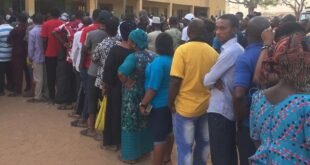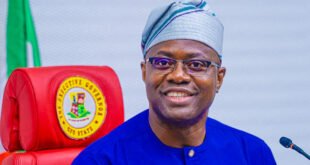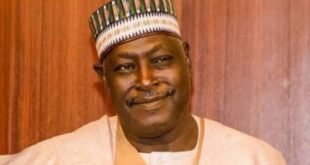In the complex panorama of Nigerian politics, in which ambition and resilience are tested daily, few figures have sailed the twists and turns with the same level of charisma and strategic reinvention as Senator Godswill Obot Akpabio.
From his first days as a child in mourning in the Ukana to his current role as president of the tenth Senate of the Federal Republic of Nigeria, the Odyssey of Akpabio captures the essence of the political complexity of Nigeria. It is a story of contradictions, results and survival. It is also a narration of transformation, personal and political, which reflects the very fabric of the nation that now helps to govern.
● A base forging in adversity
Born on 9 December 1962 in Ukana, Essien Udim, Akwa Ibom State, the training years of Akpabio were modeled by tragedy and resilience. Losing his father at a young age, he was raised by his mother, a teacher whose devotion to education and discipline left an indelible imprint on his world view.
The inheritance of the public service is deep in his family. His grandfather, Okuku Udo Akpabio, was a head of the mandate in the colonial Ikot Ekpene, while his uncle, dr. Ibanga Akpabio, served as minister in old Eastern Nigeria. From this lineage, Akpabio has inherited not only a name, but a weight of expectation.
Educated at the Methodist Primary School, Ukana, Federal Government College, Port Harcourt and University of Calabar, where he studied the law, the first leadership instincts of Akpabio were evident. In Calabar, he was the speaker of the students’ union parliament, an early indication of the oratory skills and the strategic mind that would later define his political career.
● The creation of a leader
Akpabio cut professional teeth in Paul Usoro and Co., one of the main law firms of Nigeria, before venturing into telecommunications, becoming CEO of Emis Telecom Limited. In that role, he contributed to modeling the Nigeria’s nascent telecommunications sector, to refine the skills of negotiation, thought of systems and business management.
As luckyly wanted, in 2002 his political journey really started. Appointed commissioner for oil and natural resources in the state of Akwa Ibom by the then governor Obong Victor Atth, Akpabio quickly demonstrated a talent for the public administration. Later he would have held the role of commissioner for the local government and the business and lands and housing affairs, building basic networks and political capital. In 2006, it emerged as the government candidate of the Democratic Party (PDP) of the people, defeating 5 other aspirants and continuing to win the elections of the Governor of 2007.
● The transformative era of the unusual governor in Akwa Ibom
What followed was a governance experiment that gained national attention and sobriquet: “The uncommon transformer”.
The two -terms mandate of Akpabio as a governor of the state of Akwa Ibom from 2007 to 2015 was marked by the aggressive development of infrastructures. He built roads, schools, hospitals and now iconic Ibom International Stadium.
Perhaps his most lasting legacy was his declaration of free and mandatory education with a secondary primary level, a move that raised the burden of school taxes from thousands of families and changed the trajectory of a generation. His administration has built over 4,000 classrooms, distributed uniforms and free textbooks and renamed Akwa Ibom as a model of subnational development.
However, his years in office were not without questions. Like many Nigerian leaders, Akpabio has faced a control in a system in which the accusations often exceed tests. Accusations of financial impropriety emerged, pushing the commission for economic and financial crimes (EFCC) to open investigations on the statements that over 100 billion billion had been appropriate. No formal accusations have been advanced and the question was quietly withdrawn in the background. Akpabio has constantly rejected the accusations, attributing them to the political persecution and permanence of the company from the record of his administration.
● National phase: from the senator to the legislative apex
In 2015, he moved to the national phase, winning the seat in the Senate for Akwa Ibom North-West with over 422,000 votes. He was appointed leader of the minority of the Senate, commanding respect for his colleagues and further radical his place as one of the most influential politicians in the South-South.
Even so, 2018 saw a dramatic turning point in its political trajectory. Akpabio has deserted at the All Progressives Congress (APC), citing the need to align with the center for the benefit of his people. It was a calculated bet that aroused praise and criticism, and although he lost the seat in the Senate in the 2019 elections, the move positioned it within the nucleus of national power.
Unmissable, he was appointed minister for Niger Delta’s affairs by President Muhammadu Buhari in 2019. The direct development in a region often marked by a vast potential that by persistent challenges, Akpabio began to consolidate progress, countered in a region. He gave priority to the completion of the long-lasting headquarters of the Niger Delta Development Commission (NDDC) and has started several regional projects aimed at catalyzing a socio-economic growth.
His ministerial mandate, however, was not without moments of turbulence. There were concerns about financial management within the NDDC, together with the tensions with its provisional management committee. Public hearings occasionally became theatrical, drawing intense media control. However, Akpabio claimed that his intentions had focused on the reform of the Commission and on the restoration of credibility to his operations.
In 2023, the curtain got up in a new chapter. Akpabio emerged as president of the tenth Senate following the continuation of the APC to power under President Bola Ahmed Tinubu.
The victory of Akpabio, reached through a mixture of the building of political and transversal alliance, positioned it as the third most powerful official in the Nigerian state. Ever since he assumed the presidency of the Senate, he has thrown his weight behind the renewed agenda of the hope of Tinubu, making the passage of the passage of key legislative tools including the joint law of revenue (factory) and support the tax reform initiatives oriented towards tax sustainability.
● Controversy between charisma and competence
Akpabio presided over a chamber which, although occasionally rowdy, showed signs of consistency and legislative thrust. However, it was not entirely immune to the controversy. Some public observations during periods of economic difficulty have aroused reactions, in particular his comment as “enjoyment”, which has attracted considerable attention. More recently, starting from June 2025, he is competing for a cause of defamation presented by Senator Natasha Akpoti-Auduaghan, who asks for damage to ₦ 100 billion years. The cause, rooted in alleged defamatory observations, underlines the polarized nature of the legislative discourse of Nigeria. In a prudence show, he retired from a presidential panel that investigated sexual harassment in tertiary institutions, recognizing the need to avoid any perception of prejudice.
However, Akpabio remains a formidable figure in Nigerian politics. His leadership of the National Assembly has favored a most collaborative executive-lumber report, which allowed the Tinubu president to accelerate reforms in sectors such as student loans, infrastructure funding and public service pensions. While some have expressed concern for the perceived alignment of the Senate with the executive, others see in Akpabio a manufacturer of bridges that recognizes the importance of harmony in a young and evolving democracy.
Beyond the eyes of the public, Akpabio is a family man and a devoted Catholic. Married to Ekaette Unoma Akpabio, founder of the initiative for the strengthening of family life, is the father of five children. His philanthropic gestures are often channeled through educational scholarships and empowerment programs, rooted in one personal vote that no child should bear the difficulties he has once faced. Over the years, his contributions have gained numerous awards, including the commander of the Order of Niger (Con) and a certificate of congress recognition of the United States.
For his supporters, Akpabio is a visionary, a transformative leader whose instinct for political survival is combined only with his appetite for development. For its critics, it represents the tensions and paradoxes that define Nigerian politics: charismatic but controversial, transformative but examined. But what is indisputable is that it has remained relevant through every evolution tide, sailing storms that would have sunk minor men.
While Nigeria faces a new era of economic recalibration, demographic pressures and social transformation, the role of Akpabio as president of the Senate will remain critical. It is at an intersection in which experience meets the opportunity. His political odyssey, full of lessons and bequests, offers him the opportunity to model the Senate in a more reactive and reform -oriented institution. It remains to be seen if you have that moment with the stall it requires. But if the story is a guide, it is not one to waste a second act.
In the end, the story of Senator Godswill Akpabio is more than a chronicle of personal ambition. It is a reflection of the possibilities and pitfalls of Nigerian democracy. It is the story of how a ukana boy has transformed pain into the grit and how, through pure willpower, he remained one of the most consequential political figures of his generation.
In the theater of democracy that takes place in Nigeria, Akpabio remains both an actor and architect, led by faith, fueled by the ambition and defined by the transformation. It is revered or insulted, “the uncommon transformer” remains an imposing figure in the democratic saga of Nigeria. While Nigeria navigates in its democratic evolution, Akpabio’s ability to transform challenges into opportunities can still define its inheritance.
■ Ainofenokhai Isa contributed with this piece by Benin City.
Stay forward with the latest updates!
Join the Conclaveng on WhatsApp and Telegram for notices of news in real time, rupture stories and exclusive content delivered directly to the phone. Don’t miss a title: Sign up now!
Join our WhatsApp channel
Join our Telegram channel
 JamzNG Latest News, Gist, Entertainment in Nigeria
JamzNG Latest News, Gist, Entertainment in Nigeria









